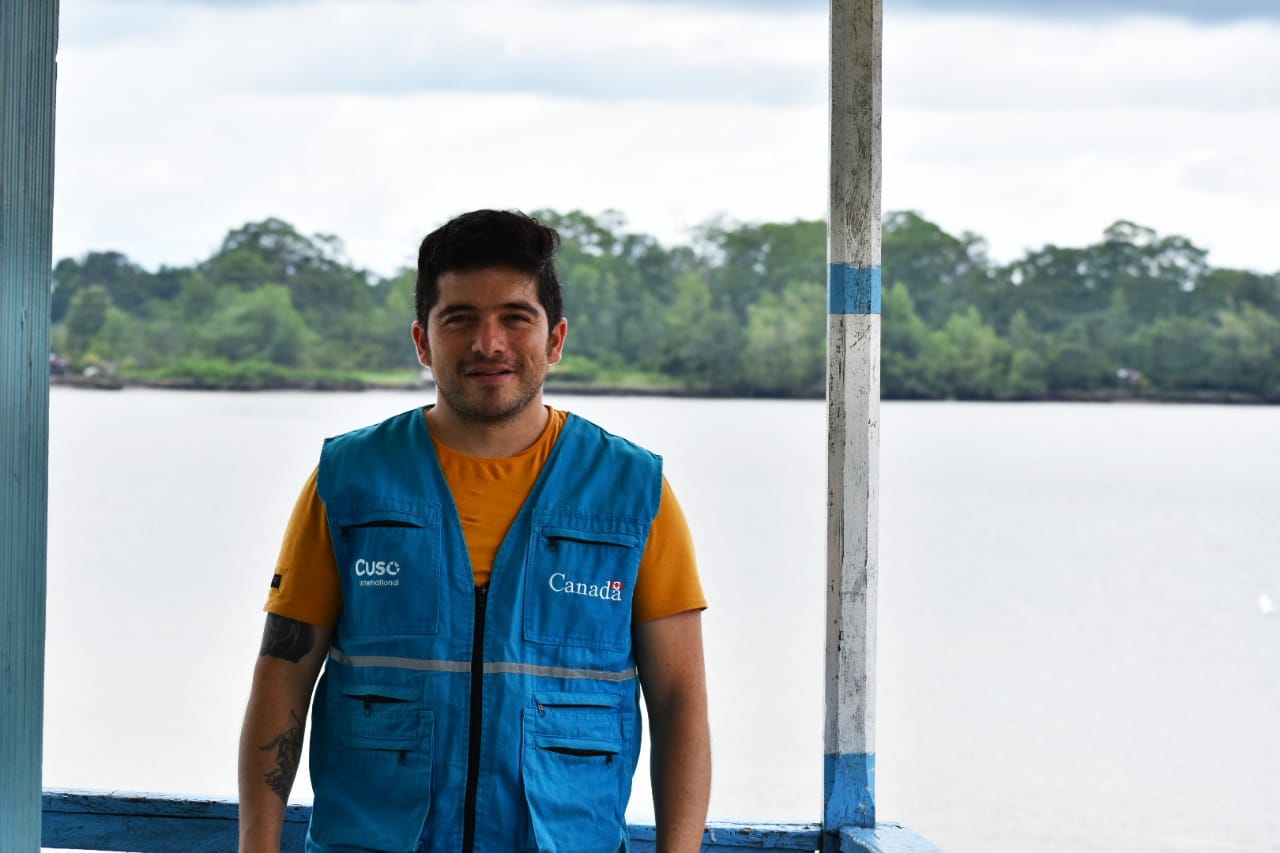Driving action on climate change in Afro Colombian communities
Story

In Afro-Colombian territories on the Pacific coast of South America, community members have noticed weather changes and have found fish in new places. But because they often lack access to the Internet, these hard-to-reach communities find it challenging to learn the latest information about climate issues.
Helping increase their knowledge is Sebastián Martínez Silva, a Montreal-based biologist and volunteer with Cuso International. Sebastián has been working with local partner organization Fundación A-Kasa, to help communities recognize how environmental degradation is adversely impacting them, and how they can mitigate its effects.
“Part of the process means giving community members the ability to manage their own circumstance and participate in actions that will make a positive difference to them,” said Sebastián.
Along with colleagues at Fundación A-Kasa, a long time Cuso International partner, Sebastián initially wanted to speak with the community about ecotourism and climate change. He quickly learned that the local women did not have a say in business or financial decisions.
“It became important to include this aspect in our conversations,” explained Sebastián.
Working with Fundación A-Kasa, Sebastián initiated a series of workshops in the Colombian coastal villages of Mulatos, Iscuandé, Cuerval, and Playa Chacón.
“We wanted the community to understand their potential and ability to manage their own development,” said Sebastián.
The workshops dealt with gender equity and the importance of women’s work in the community, the impact of climate change, and how better understanding of these issues can strengthen their communities. Green business ideas, such as cocoa processing, ecotourism, and selling crafts for tourists using local and responsibly harvested materials, were also included in the discussions.
Ana Virginia Campaz, a nurse in the village of Soledad Pueblito, knows the workshops are an important element for community members to learn and acknowledge these issues are real.
“To me, things about climate change and many other things are clearer now,” she said. “It motivated me to know clearly why and how things happen and how they are changing every day.”
Ana is one of nearly 70 people who participated in the workshops, the majority of whom were women and people under 30 years old.
During a second round of workshops, Sebastián found there were more men coming to the gender-focused sessions. They talked about how men don’t have to be loud and aggressive, that women should not always be the ones in the kitchen, and the importance of giving women space to express themselves.
“This is very important because if we’re going to talk about gender, we need to be both at the table,” said Sebastián.
The workshops also took on a very specific entrepreneurial track. Members learned the basics of how to develop and sustain green businesses, using their natural resources responsibly. The workshops also reinforced the importance of ensuring women in the community have more of a say when it comes to formulating business ideas and being entrepreneurs themselves.
“If the community gets more money from marketing a resource, but women don’t have a say in what they do with their money, nothing is going to change,” said Sebastián. “The process of getting ahead will be slower.”
Attending one of the workshops was Deyanira del Carmen Erazo Paredes, a 57-year-old mother of three. Following the workshop, she quickly noticed changes in the community, such as serving food in ceramic dishes instead of using disposable plastic boxes.
With a small group of community members, Deyanira started building an eco-hotel. Her goal is to grow the business and change the mentality of young people about their potential roles taking action against climate change.
“I know they don’t see it now, but in the long term they will see that not only is fishing a source of money and work, but there are also other things that can be done to generate economic resources,” she said. “We have begun to look at our territories in a different way and with much more value. Every day that there are meetings people want to attend more, they want to listen.”
As Sebastián spends time with community members, he too is learning through their fishing, cooking, and everyday activities. He now has a much better understanding of the needs of each community and the kinds of projects each one wants. Sebastián is looking forward to hosting more workshops in 2023, and he aims to have a more specialized approach in each community.
“I want everyone to be onboard, but even if just 10 per cent of the people actually make use of the information we talked about, I think it will make a big difference,” said Sebastián.
As they were leaving one of the workshops, one young participant, Derlin, told Sebastián that most of her family and community members tell her she should be thinking about starting a family. But she wants to go to Cali to become an engineer – “I know with this education, I can do more to help climate issues in my community,” said Derlin.